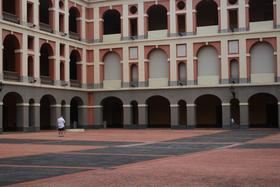For the 2025-26 school year, there are 7 public schools serving 3,780 students in Dillon 04 School District. This district's average testing ranking is 2/10, which is in the bottom 50% of public schools in South Carolina.
Public Schools in Dillon 04 School District have an average math proficiency score of 28% (versus the South Carolina public school average of 43%), and reading proficiency score of 35% (versus the 52% statewide average).
Minority enrollment is 74% of the student body (majority Black), which is more than the South Carolina public school average of 53% (majority Black).
<麻豆果冻传媒 class='so-dt-title' id="overview">Overview<麻豆果冻传媒 class='so-dt-title' id="student-by-grade">Student By Grade <麻豆果冻传媒 class='so-dt-title' id="district-rank">District Rank<麻豆果冻传媒 class='so-dt-title' id="students-by-ethnicity">Students by Ethnicity: <麻豆果冻传媒 class="so-dt-title" id="district-revenue-and-spending">District Revenue and Spending
This School District
This State (SC)
# Schools
7 Schools
1,274 Schools
# Students
3,780 Students
793,779 Students
# Teachers
217 Teachers
55,959 Teachers
Student-Teacher Ratio
17:1
17:1
Dillon 04 School District, which is ranked within the bottom 50% of all 74 school districts in South Carolina (based off of combined math and reading proficiency testing data) for the 2022-2023 school year.
The school district's graduation rate of 82% has decreased from 86% over five school years.
Overall District Rank
#61 out of 74 school districts
(Bottom 50%)
(Bottom 50%)
Math Test Scores (% Proficient)
28%
43%
Reading/Language Arts Test Scores (% Proficient)
35%
52%
Science Test Scores (% Proficient)
31%
50%
Graduation Rate
82%
84%
Diversity Score
0.59
0.67
% American Indian
2%
n/a
% Asian
n/a
2%
% Hispanic
6%
14%
% Black
59%
31%
% White
26%
47%
% Hawaiian
n/a
n/a
% Two or more races
7%
6%
All Ethnic Groups
The revenue/student of $12,360 in this school district is less than the state median of $15,223. The school district revenue/student has stayed relatively flat over four school years.
The school district's spending/student of $11,808 is less than the state median of $14,820. The school district spending/student has stayed relatively flat over four school years.
Total Revenue
$47 MM
$12,084 MM
Spending
$45 MM
$11,764 MM
Revenue / Student
$12,360
$15,223
Spending / Student
$11,808
$14,820
Best Dillon 04 School District Public Schools (2025-26)
School
(Math and Reading Proficiency)
(Math and Reading Proficiency)
Location
Quick Facts
Rank: #11.
Dillon High School
(Math: 55-59% | Reading: 78%)
Rank:
Rank:
9/
Top 20%10
1730 Highway 301 North
Dillon, SC 29536
(843) 774-1230
Dillon, SC 29536
(843) 774-1230
Gr: 9-12 | 824 students Student-teacher ratio: 17:1 Minority enrollment: 81%
Rank: #22.
Stewart Heights Elementary School
(Math: 65-69% | Reading: 30-34%)
Rank:
Rank:
6/
Top 50%10
1001 West Calhoun Street
Dillon, SC 29536
(843) 774-1219
Dillon, SC 29536
(843) 774-1219
Gr: PK-3 | 572 students Student-teacher ratio: 19:1 Minority enrollment: 90%
Rank: #33.
Lake View High School
(Math: 31% | Reading: 42%)
Rank:
Rank:
4/
Bottom 50%10
401 East Third Avenue
Lake View, SC 29563
(843) 759-3009
Lake View, SC 29563
(843) 759-3009
Gr: 6-12 | 517 students Student-teacher ratio: 14:1 Minority enrollment: 49%
Rank: #44.
Lake View Elementary School
(Math: 30-34% | Reading: 35-39%)
Rank:
Rank:
3/
Bottom 50%10
1311 Scott Street
Lake View, SC 29563
(843) 759-3003
Lake View, SC 29563
(843) 759-3003
Gr: PK-5 | 375 students Student-teacher ratio: 20:1 Minority enrollment: 56%
Rank: #55.
East Elementary School
(Math: 30-34% | Reading: 25-29%)
Rank:
Rank:
3/
Bottom 50%10
901 East Harrison Street
Dillon, SC 29536
(843) 774-1222
Dillon, SC 29536
(843) 774-1222
Gr: PK-3 | 433 students Student-teacher ratio: 19:1 Minority enrollment: 70%
Rank: #66.
Dillon Middle School
(Math: 21% | Reading: 26%)
Rank:
Rank:
2/
Bottom 50%10
1803 Joan Drive
Dillon, SC 29536
(843) 774-1212
Dillon, SC 29536
(843) 774-1212
Gr: 6-8 | 615 students Student-teacher ratio: 17:1 Minority enrollment: 81%
Rank: #77.
Gordon Elementary School
(Math: 18% | Reading: 25%)
Rank:
Rank:
1/
Bottom 50%10
926 Perry Avenue
Dillon, SC 29536
(843) 774-1227
Dillon, SC 29536
(843) 774-1227
Gr: 4-5 | 444 students Student-teacher ratio: 19:1 Minority enrollment: 80%
<麻豆果冻传媒 class='so-dt-title' id='faq'>Frequently Asked Questions
How many schools belong to Dillon 04 School District?
Dillon 04 School District manages 7 public schools serving 3,780 students.
What is the rank of Dillon 04hool District?
Dillon 04hool District is ranked #61 out of 74 school districts in South Carolina (bottom 50%) based off of combined math and reading proficiency testing data for the 2022-2023 school year.
What is the racial composition of students in Dillon 04hool District?
59% of Dillon 04hool District students are Black, 26% of students are White, 7% of students are Two or more races, 6% of students are Hispanic, and 2% of students are American Indian.
What is the student/teacher ratio of Dillon 04hool District?
Dillon 04hool District has a student/teacher ratio of 17:1, which is higher than the South Carolina state average of 14:1.
What is Dillon 04hool District's spending/student ratio?
The school district's spending/student of $11,808 is less than the state median of $14,820. The school district spending/student has stayed relatively flat over four school years.
麻豆果冻传媒 Articles

How Public Schools Support Students on Free / Reduced-Lunch Programs
Explore how U.S. public schools support students eligible for free or reduced-price lunch through nutrition, academic, and wraparound services in 2025.

Hidden Costs of Public Schools: Fees, Supplies & Extras
Explore the hidden costs in public schools鈥攆ees, supplies, extracurriculars鈥攁nd how parents can plan for them in 2025.

Public School Funding 2025: What Families Should Know
Essential insights on public school funding in 2025鈥攈ow it works, what鈥檚 changing, and what families should know to stay ahead.




